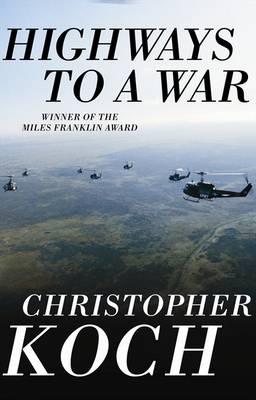The novel is a study of war photographers in South East Asia in the 1970s. The three principals are Jimmie Feng, Dmitri Volko, and Mike Langford; the last is the protagonist. Mike is from Tasmania and there is where I got this copy in 2014.

The descriptions of life and war in South East Asia are etched, and at times lyrical, the heat of the day, the bird song before sunup, the sapping humidity, the blinding sun, the people rooted to the land, the cool of the night,contrasted to the blare of American Saigon, the wumps of helicopters, the paralysing fear and chaos of a firefight, the confusion of battle, the mistrust of those people rooted to the land. It is all there in a kaleidoscope of sounds and colours. Much of the book can be read for a vicarious ride into the world of these war-lovers, as per the John Hersey novel.
The first experience of combat is terrifying. Enduring a B-52 bombing is unendurable. Volkov’s drunken lament is moving. The political theory seminar, complete with references to Hegel, in the jungle is compelling.
Mike is a Christ figure trying to save just about everyone and finding that he is all too human, too frail to do that. Indeed his unremitting inarticulate goodness wore down this reader. Even more tedious was his universal sex appeal; it read like an adolescent boy’s wet dream. Still worse was the recognition of his gift of grace in the early pages. The world does not work like that.
This reader was also worn down by 511 pages many of which were repetitious, first Vietnam and then Cambodia, each the same story told twice. Koch may have had to write it to exorcise his demons but I did not need to read it, and the second telling is lesser for my want of attention. Yes, I turned the pages ever faster.
 Christopher Koch
Christopher Koch
Niggles, there were a few, I do not know what a ‘Tasmanian bluey’ is and neither did the Tasmanians I asked. I have never seen it spelled ‘tzarist’ before and neither has the spell checker. The many references, including some in the Launceston setting at the start of the novel, to the Australian Broadcasting Service in the 1970s made me wonder where the ABC was. By the way, we never do get back to Launceston despite the elaborate setup. I also stopped short at a reference to blue eyes in old photograph of a great grandfather. Do the arithmetic and that great grandfather’s photograph must have been in black-and-white.
I chose this book because I have read other Koch novels and trusted him on two counts, to have a story to tell and to tell it well. He met both those criteria despite my niggles and plaints.
Skip to content
